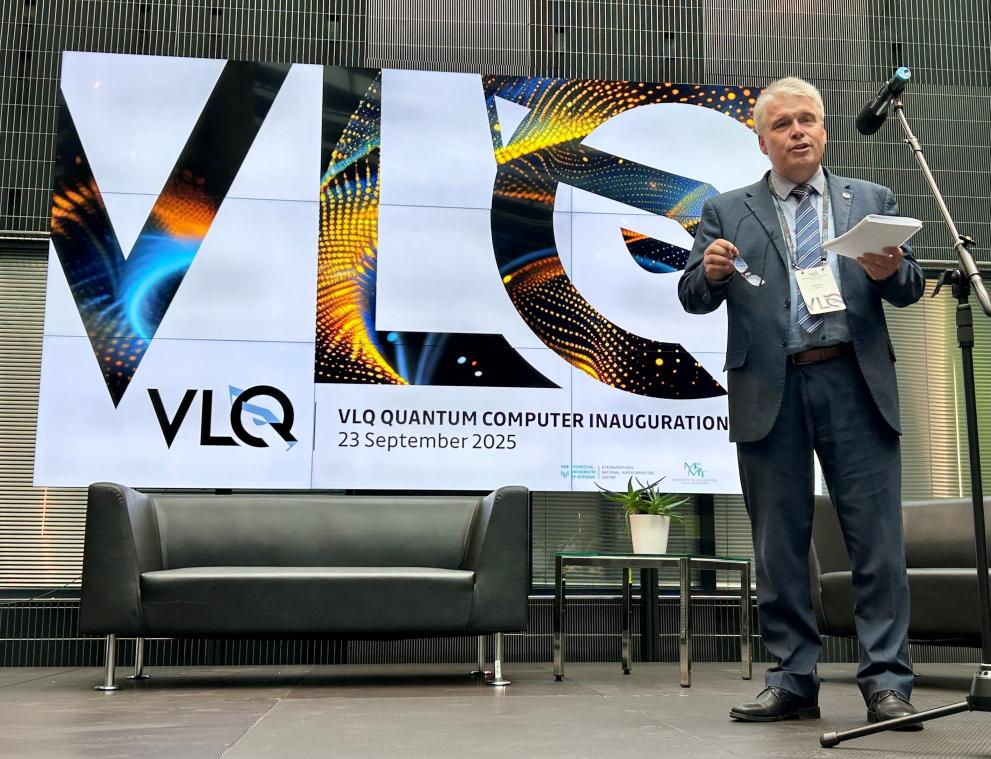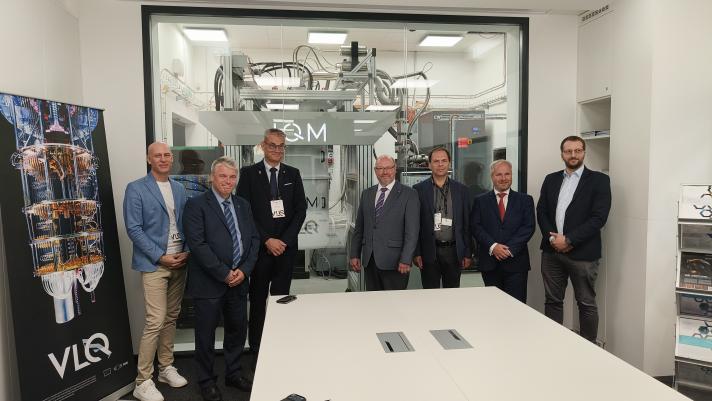
The inauguration ceremony was hosted by IT4Innovations National Supercomputing Center (IT4Innovations) and brought together high-level representatives from across Europe, underlining the truly pan-European nature of this project. As the system is the result of a consortium of eight participating countries: Czechia, Finland, Sweden, Denmark, Poland, Norway, Belgium, and the Netherlands. The ceremony was also attended by Rafal Duczmal, Chair of the EuroHPC JU Governing Board and Anders Jensen, the Executive Director of the EuroHPC Joint Undertaking.
Hosted and operated by IT4Innovations in Ostrava and supplied by IQM Quantum Computers, ‘VLQ’ is a quantum computer based on superconducting qubits. The system will offer 24 physical qubits arranged in a star-shaped topology coupled to a central resonator. This particular layout will minimise the number of necessary swap operations between qubits, allowing more complex quantum calculations to run efficiently.
Like all other EuroHPC quantum computers currently under deployment, this system will be integrated with the European high-performance computing (HPC) infrastructure. VLQ will be coupled with the EuroHPC supercomputer Karolina, offering European end-users access to hybrid classical-quantum architecture.
While the system’s final calibration is still ongoing, VLQ is expected to offer compute resources to European end-users by the end of the year. It will support them in exploring new applications and algorithms, including Quantum Machine Learning (QML). These algorithms will offer exponential speed-ups compared to purely classical processing. Primarily aimed at research and innovation, it will also be accessible to a broad range of European users, from academia and industry to the public sector.
Anders Jensen, Executive Director of the EuroHPC Joint Undertaking stated:
“With VLQ, Europe is taking another decisive step toward deploying a world-class European quantum computing ecosystem. By combining the strengths of our supercomputers with state-of-the art quantum technologies, we are giving European users the tools to explore solutions that were previously out of reach. Today’s inauguration is also a testament to the power of European collaboration: together, we are laying the foundation for breakthroughs that will shape the future of science, technology, and society.”
Branislav Jansik, Director of Supercomputing Services at IT4Innovations and coordinator of LUMI-Q consortium, added:
“The VLQ quantum computer will serve a broad spectrum of European users – from academic institutions and industrial companies to the public sector. It will primarily support research and innovation, and its capacities will be accessible to all users across Europe via EuroHPC JU.”
More details
Owned by the EuroHPC JU, VLQ is co-funded with a total acquisition cost of around EUR 5 million. The EuroHPC JU will fund 50% of the costs and the remaining 50% will be funded by the LUMI-Q consortium. The LUMI-Q consortium is a true pan-European collaboration effort bringing together thirteen partners from eight European countries: Czechia, Finland, Sweden, Denmark, Poland, Norway, Belgium and the Netherlands.
The VLQ acronym refers to V (VSB, the Technical University of Ostrava where the system is located), L (the LUMI-Q consortium behind the initiative) and Q (Quantum Computing). The name of the system is also a special nod to the LUMI-Q consortium: “vlk” means “wolf” in Czech, echoing the arctic wolf that symbolises the LUMI supercomputer. Located in Finland, LUMI is one of the world’s most powerful systems and has exceptional energy efficiency. It runs entirely on carbon-free hydroelectric power, uses liquid cooling to keep its processors at optimal temperatures, and repurposes waste heat to supply the local district heating network. Its data centre also benefits from the naturally cold climate of northern Finland, further boosting its sustainability.
- LUMI-Q Consortium Unveils the VLQ Quantum Computer for the Czech and European Science Community, IT4I press release
Background
To date, the EuroHPC JU has procured six quantum computers, located across Europe, with PIAST-Q, being the first, inaugurated in Poland in June. The deployment of these quantum computers across Europe aims to offer the widest possible variety of European quantum computing platforms and hybrid classical-quantum architectures, including analogue quantum simulators based on neutral atoms, trapped ions, superconducting circuits, and photonics to adiabatic systems, enabling the execution of annealing routines. This approach positions Europe at the forefront of this emerging field while providing European end-users with access to diverse and complementary quantum technologies.
In addition to these six systems, two analogue quantum simulators have been procured under the EuroHPC JU project HPCQS. They are currently undergoing final calibration and eventual commissioning in France (GENCI) and Germany (Julich Supercomputing Centre, JSC).
Earlier this month, the EuroHPC JU also launched the procurement process for a new EuroHPC quantum computer to be hosted and operated by SURF in the Netherlands.
About EuroHPC JU
The EuroHPC JU is a legal and funding entity that brings together the European Union and participating countries to coordinate efforts and pool resources with the objective of making Europe a world leader in supercomputing.
To equip Europe with a cutting-edge supercomputing infrastructure, the EuroHPC JU has already procured 11 supercomputers, distributed across Europe. Three of these EuroHPC supercomputers are now ranked among the world’s top 10 most powerful supercomputers: JUPITER in Germany ranks at 4, becoming Europe’s new fastest supercomputer along with LUMI in Finland (9th place), Leonardo in Italy (10th place).
European scientists and users from the public sector and industry can benefit from EuroHPC supercomputers via the EuroHPC Access Calls no matter where in Europe they are located, to advance science and support the development of a wide range of applications with industrial, scientific and societal relevance for Europe.
Currently, the EuroHPC JU is also overseeing the implementation of 13 AI factories across Europe that offer free, customised support to SMEs and startups.
The EuroHPC JU also funds research and innovation projects to develop a full European supercomputing supply chain, from processors and software to applications to be run on these supercomputers and know-how to develop strong European HPC expertise.
About IT4Innovations
IT4Innovations National Supercomputing Center at VSB – Technical University of Ostrava is a leading research, development, and innovation centre active in the fields of High-Performance Computing (HPC), Data Analysis (HPDA), Quantum Computing (QC), and Artificial Intelligence (AI) and their application to other scientific fields, industry, and society.
Since 2013, IT4Innovations has been operating the most powerful supercomputing systems in the Czechia, which are provided to Czech and foreign research teams from academia and industry. Together and the CESNET and CERIT-SC institutions, IT4Innovations constitute e-INFRA CZ, a strategic research infrastructure of the Czechia
At present, IT4Innovations runs two supercomputers: Czech most powerful supercomputer Karolina (15.7 PFlop/s, installed in the summer of 2021), and Barbora (849 TFlop/s, installed in the autumn of 2019). Apart from the supercomputers operated at IT4Innovations, Czech research communities also have access to the LUMI supercomputer thanks to IT4Innovations' membership in the LUMI consortium. In 2025, the first Czech quantum computer, operated by the LUMI-Q consortium, was installed at IT4Innovations.
The key research areas of IT4Innovations include big data processing and analysis, machine learning, development of parallel scalable algorithms and algorithms for quantum computers and simulators, the solution to computationally demanding engineering problems, advanced visualisation, virtual reality, modelling for nanotechnologies, and material design. For more information, see www.it4i.eu.
About IQM Quantum Computers
IQM is a global leader in designing, building, and selling superconducting quantum computers. IQM provides both on-premises full-stack quantum computers and a cloud platform to access its computers anywhere in the world.
IQM customers include the leading high-performance computing centres, research labs, universities and enterprises which have full access to IQM's software and hardware. IQM has over 280 employees with offices in Espoo, Munich, Paris, Warsaw, Madrid and Singapore.
Details
- Publication date
- 23 September 2025
- Author
- European High-Performance Computing Joint Undertaking
